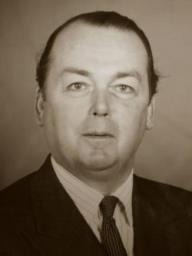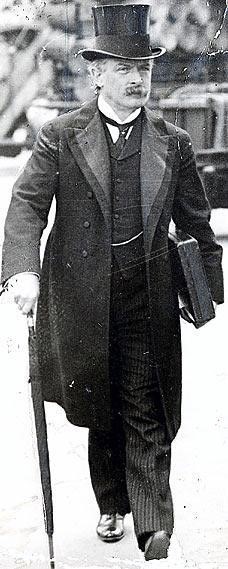
Earl Lloyd George talk at the National Liberal Club
The joint Kettner Lunch/Liberal Democrat History Group meeting at the National Liberal Club yesterday was a great success. Peter Whyte of the Kettner Lunch announced that the attendance at the event was the best, the highest for any lunch since the foundation of the Kettner Lunch 34 years ago. The numbers were so great that the venue had to be switched from the Lady Violet Room into the more spacious David Lloyd George Room next door – which given the subject matter and speaker was completely appropriate.
The topic for the talk was of course David Lloyd George and the speaker was the current Earl Lloyd George of Dwyfor, the 3rd Earl who is the grandson of the great Welshman. The Earl started with the explanation of how his grandfather came to be born in Manchester as his father, William George, tried to better his prospects by leaving Pembrokeshire farming and becoming a schoolteacher. But he was not in good health and only a few months after David’s birth the family returned to Wales. William George died soon after when David was about 17 months old and his second son, also William, was born after his father’s death. The boys’ mother, Betsy Lloyd was from north Wales and she took her sons to live with her brother Richard Lloyd (uncle Lloyd as he was known to the boys) in the village of Llanystumdwy between Criccieth and Pwllheli. Earl Lloyd George paid high tribute to uncle Lloyd, saying how he had worked hard to ensure his nephews had a good education, even to the extent of learning foreign languages (including English) to help them with their schooling. Eventually they both qualified as solicitors and set up in Portmadoc. A practice named Lloyd George and George still flourishes there today.
The Earl defined his grandfather’s life in terms of the important milestones. First was his marriage to Margaret Owen in 1888 in the face of the initial opposition from Margaret’s Methodist parents to marriage with a Baptist. Next was the by-election of 1890 which propelled him into Parliament as the member for Caernarfon Boroughs by the narrow margin of 18 votes but where he stayed, being re-elected at every contest, until he finally resigned in 1944. Another important milestone was the meeting at Birmingham Town Hall in December 1901 where LG had gone to attempt to deliver a speech about the Boer War. The atmosphere was openly hostile in Chamberlainite Birmingham and LG escaped the violence only by being smuggled out of the venue disguised as a policeman.
Once LG had established himself and was a successful government minister, came what Earl Lloyd George estimated was his grandfather’s finest hour. LG became Chancellor of the Exchequer and the government embarked on its programme of social reform, centred around the 1909 People’s Budget. This of course caused the struggle with the House of Lords for political supremacy and led to the 1911 Parliament Act. Earl Lloyd George quoted one of LG’s biographers, John Grigg, as describing 1911 as Lloyd George’s ‘annus mirabilis’.
Earl Lloyd George also offered one or two family anecdotes. When war broke out in 1914, Lloyd George called in the gold reserves and issued replacement paper money, including the first ever ten shilling notes. The first one off the presses was given to LG as a memento but unfortunately the Earl’s mother did not realise its significance and used it to pay the butcher.
LG’s role as Minister for Munitions (an apparent demotion he was prepared to accept in order to assist the war effort) was next mentioned and then, once he became prime minister, his innovation of a small war cabinet. Churchill followed this precedent in 1940. Earl Lloyd George asked us to compare 1917 with 1940 and to remember that it was a precarious time for the country. Russia, Italy and Romania (allies with Britain against the Central Powers) had been forced out of the war; the Americans, although just coming in were not yet fully committed and shipping was being lost at an alarming rate. It was against this fragile background that LG led the country to victory and through the Paris Peace Conference.
Although the Lloyd George coalition government with the Conservatives from 1918-1922 often gets a bad press, Earl Lloyd George asked to consider some of its achievements, the first votes for women, Welsh disestablishment and the Irish settlement.
At this time, the Earl told us the story of the young Conservative MP who unexpectedly found himself appointed to government office and who was asked by his colleagues at his Club how he had got on so well so quickly. ‘Oh’ explained the young man, ‘Lloyd George knew my father.’ And so was born the saying that has endured and had been sung to the tune of ‘Onward Christian Soldiers’ down the ages.
Earl Lloyd George referred to the cartoonists’ caricatures of his grandfather, showing him as a small figure. This was wrong. LG was broad-chested with a large head and penetrating blue eyes which constantly seemed to be twinkling. He was always immaculately dressed and exuded a personality which was captivating for the family children – and for many others. However by contrast, he was a naturally clumsy man, finding it hard even to open doors the right way. In the television series shown about him in the 1980s, Lloyd George was portrayed riding a bicycle. This was complete misrepresentation, LG could not balance on a bike and would certainly have fallen off according to his grandson.
Returning to politics, Earl Lloyd George remarked that he thought it a tragedy for the country that during the 1920s and 1930s the two greatest men of the 20th century, Lloyd George and Churchill were excluded from office. They got their chance in 1940, with LG’s intervention in the Norway debate a decisive factor in bringing Churchill to number 10 Downing Street.
The Earl concluded with the death of Dame Margaret in 1941, LG’s later marriage to Frances Stevenson and his death in 1945.
In answer to a question from Liberal Democrat History Group executive member York Membery, Earl Lloyd George said he thought that his grandfather would have regarded as his greatest achievement the introduction of old age pensions and national insurance. A stalwart of the Lloyd George Society, David Morgan, reminded the meeting that LG’s industrial strategy – as set out in the Yellow Book – with the idea of works’ councils, profit sharing etc. was taken up by Germany and Japan in defeat after World War Two with great success and what a pity it was that Britain had not heeded this call for industrial reform itself.
The Earl’s review of his grandfather’s life and achievements could be said to have missed out the negative things that are levelled against the Welsh Wizard but that is forgivable in a talk from within the family – and best left to historians and academics to dispute. One questioner did raise Lloyd George’s visit to see Hitler in 1936. The Earl said that he had inherited the signed photograph which Hitler had presented to LG. It now occupies a suitable place in the ‘smallest room’ in the Earl’s house.
The largest crowd to gather for a Kettner Lunch left impressed with the life of the subject and satisfied with its re-telling by his distinguished relative.
